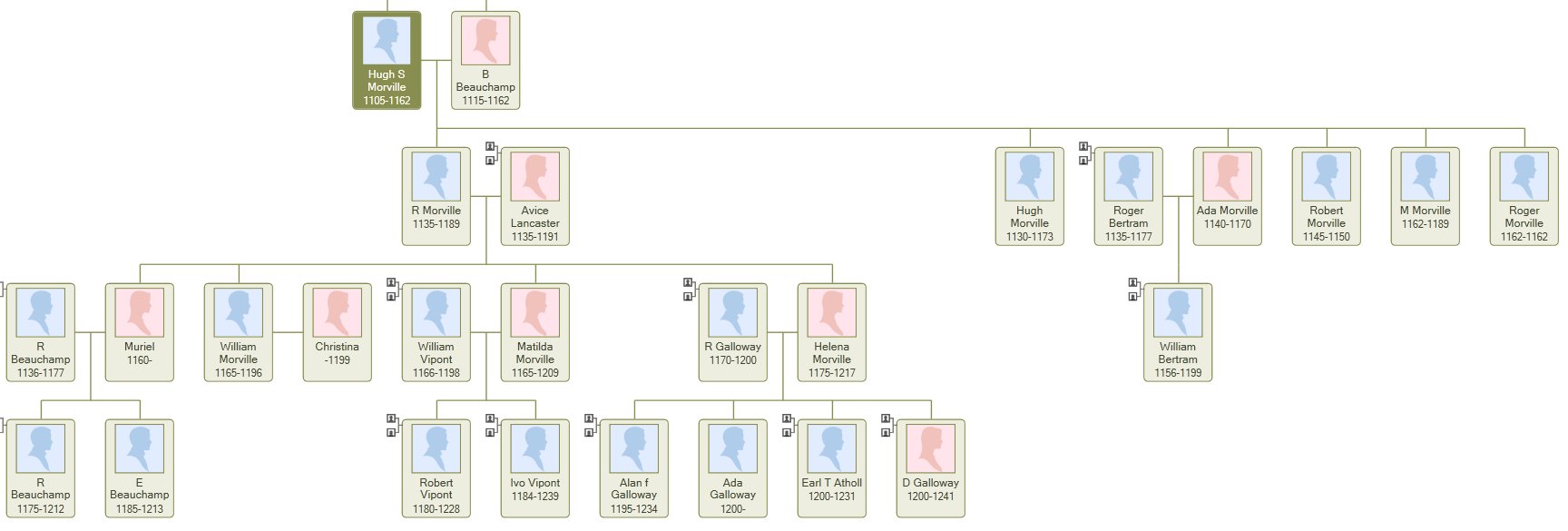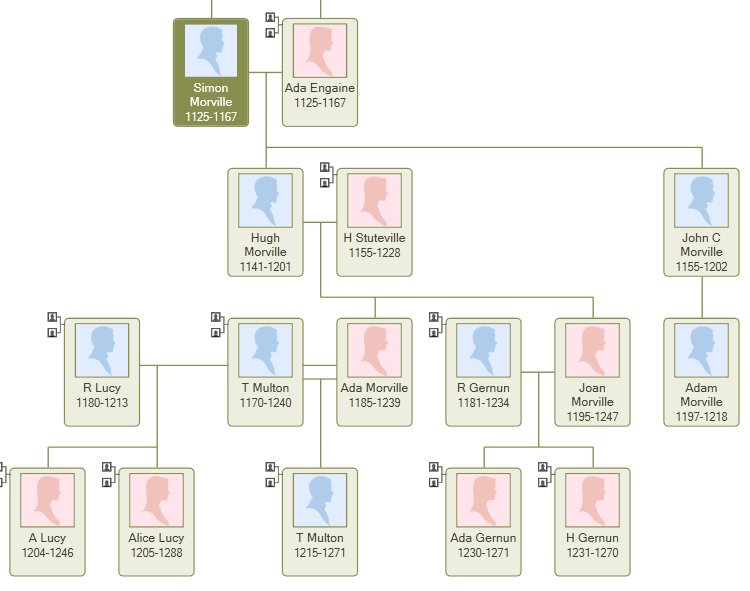The Morvilles

This is a short essay on the Morville family due to
their importance to the history of the North of England and Scotland
and also due to the fact that the family is so horribly mangled on
Wikipedia and elsewhere, with at least 2 Hugh Morvilles repeatedly
confused with each other.
The name of the progenitor of the Morville family is unknown, but there
would appear to have been 4 brothers who were in England in the early
twelfth century. The only placename like Morville in the country
at Domesday was in Shropshire, but this seems to have nothing to do
with the later family. The eldest of the Morvilles mentioned in
England seems to have been Herbert who was also lord of Montebourg in
Normandy. Herbert was also a forester of Yorkshire for King Henry I
in September 1130. He had 3 children, Roger, a priest, Herbert
and his heir, Richard, who held 5 fees of the Mowbrays in Yorkshire in
1166 and was still living in Yorkshire in 1178. He also appears
to have been the same Richard Morville who was active in Scotland for King David (1124-53) before 1140 and King Malcolm (d.1165) in 1160. Richard seems to have been the last of Herbert's line.
The next possible brother was Hugh Morville (d.1162). He is quite
well known for being constable of Scotland. In September 1130 he
was recorded as owing Danegeld in Surrey, Northamptonshire and Rutland,
apparently as a follower of King David of
Scotland. Before 1124 he was also witnessing documents for King
David. His interests appear to be totally Scottish, even after
the loss of the Northern counties to King Henry II
in 1157. Before 1130 he had married Beatrice Beauchamp, who had a
brother Roger Beauchamp of Cumberland and 2 sisters, Alice and
Amabile. Hugh died in 1162 leaving at least 5 sons and a
daughter, Ada, who had married Roger Bertram (d.1177) of Mitford.
However, the 2 sons of interest in this essay are his eldest, Hugh
(d.1173) and Richard (d.1189). The 3 presumably younger sons,
Robert, Malcolm (slain while hunting before 1189) and Roger, have only
left minor traces in the Dryburgh chartulary. The elder 2 sons
had more impact on history.

Hugh Morville (d.1173+) would seem to have been the elder son of Hugh
Morville (d.1162). He first comes to notice in Yorkshire in 1158
where he was the farmer of Knaresborough.
Presumably this was concerned with the northern counties coming back
under English control in 1157. He also witnessed a single charter
for King Malcolm (1153-65) with his father, the elder Hugh (d.1162) - Hugo de moreuill & hugone de moreuill filio eius. On 30 December 1170 it was this Hugh Morville who helped kill Thomas Becket and then fled to first Saltwood castle and then to the royal fortress of Knaresborough which he was holding for the Crown. Despite the outcry against the killers, Hugh and his accomplices remained based in Knaresborough castle until 1173 when he joined the rebellion of the Young King Henry (d.1183) and lost control of the fortress back to King Henry II (1154-89). After this he went to the Holy Land in penance and presumably died there soon after.
The younger Hugh Morville (d.1173+) was succeeded by his brother and
heir, Richard Morville (d.1189+). He presumably succeeded to the
Scottish estates of his father Hugh Morville (d.1162) and was recorded
as constable of Scotland in 1166. He may have been the Richard
who witnessed a grant of King David
(1124-53) as early as 1140. By 1160 he had fined 200m (£133
6s 8d) for having the lands of William Lancaster (d.1170), whose
daughter, Avice (d.1191) he was recorded as having married in
1170. He would appear to have joined his brother Hugh (d.1173+)
in opposition to King Henry II (1154-89) and on 8 December 1174 was given as one of the hostages for the release of King William the Lion (1165-1214). He obviously made his peace with Henry II
(d.1189) if he had ever left it and was last mentioned in 1189.
Presumably he died soon afterwards and certainly before his wife Avice
who died on 1 January 1191.
Richard Morville left a son and heir, William, who died childless in
1196. His inheritance was then divided amongst his 3 daughters,
Muriel, who married Robert Beauchamp of Hatch (d.1177+), Matilda who
married William Vipont (d.1198) and Helena who married Roland Galloway
(d.1200). His inheritance was therefore split 3 ways.
The third possible brother of the first unknown Morville could have
been William Morville who died after 1142. His main estates lay
in Devon, although he also seems to have witnessed a charter for King David
of Scotland (1124-53) before July 1138. He was succeeded by his
son, Eudo, who was born before 1142 and died sometime after 1177.
Eudo was succeeded by his son, William (d.1235) and grandson, Eudes
(d.1237), who left only daughters.

The fourth and possibly youngest of the possible brothers was Simon
Morville (d.1167). He made his fortune in Cumberland and before
1140 married Ada Engaine, the great granddaughter of Robert Trevers
(d.1100+), the lord of the barony of Burgh by Sands.
This barony had been set up by Ralph Le Meschin (d.1129) in the early
twelfth century when he became lord of Carlisle. After Cumberland was returned to King Henry II (1154-89) by King Malcolm
of Scots (1153-65) in 1157, Simon Morville was recorded as owing 50m
(£33 6s 8d) for having the land of Ralph Engaine. According
to charters in the Lanercost chartulary, Simon's wife, Ada, was the
granddaughter of Ralph Engaine, who had married Ibria Trevers before
1110. Ralph thereby inherited Burgh by Sands from her father, Robert Trevers, it then passing through his son William to Ada, the wife of Simon Morville (d.1167).
Simon Morville also had or acquired lands in Lazonby and Kirkoswald
before his death in July 1167. Simon's son, Hugh Morville
(d.1201), is often confused with the killer of Becket. This Hugh
made a charter to Wetheral priory in the late twelfth century
concerning Burgh by Sands.
In this he confirmed the gifts of his father, Simon Morville, as well
as Ralph Engaine and his son William, thereby confirming the descent
given above. Hugh was active in Westmorland from 1162 and often
associated with Robert Stuteville (d.1186), who's daughter, Helewise
(d.1228+), he eventually married soon after the death of her first
husband, William Lancaster in 1184. During the Young King's war
of 1173-74, he sided with the Young King Henry III
(d.1183) and consequently lost his Westmorland estates. Indeed
his dapifer was fined 100s for being one of those who rendered Appleby castle to King William of Scotland in 1174. Hugh worked his way back into royal favour and served both King Richard (1189-99) and briefly King John
(1199-1216). He was given a licence to build a house at Kirkoswald,
enclose the wood and have a weekly market and yearly fair there on 1
March 1201. He then died, probably before September 1201, when it
was recorded that Richard Lucy (d.1213) of Egremont
held his lands by virtue of his wife, Ada Morville (d.1232/39), the
rest of Hugh's lands going to his other daughter. The next year
William Briewer bought the custody of Hugh's other daughter, Joan
Morville (d.1247), for 500m (£333 6s 8d) and eventually married
her to his nephew, Robert Gernun (d.1234). This marked the
extinction in the male line of this branch of the Morvilles as well.
The full essay with footnotes is available by clicking here.
Copyright©2022
Paul Martin Remfry



